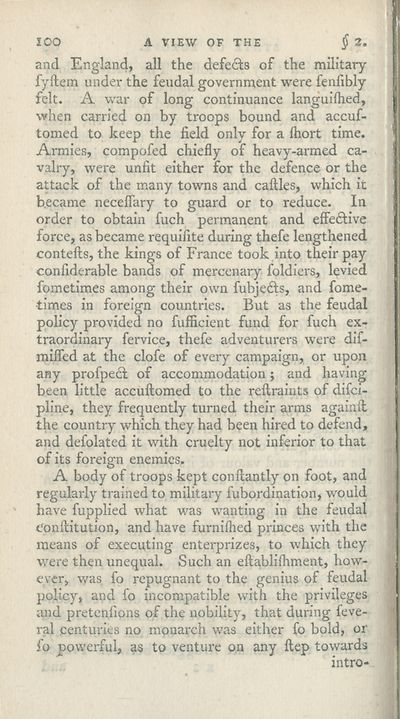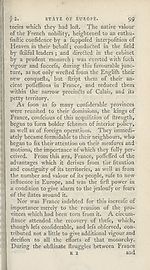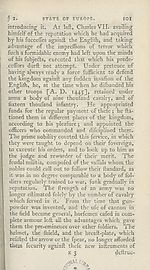Download files
Complete book:
Individual page:
Thumbnail gallery: Grid view | List view

IOO A VIEW OF THE § 2.
and England, all the defeats of the military
fyftem under the feudal government were fenfibly
felt. A war of long continuance languifhed,
when carried on by troops bound and accuf-
tomed to keep the field only for a flrort time.
Armies, compofed chiefly of heavy-armed ca¬
valry, were unfit either for the defence or the
attack of the many towns and caftles, which it
became neceflary to guard or to reduce. In
order to obtain fuch permanent and effeftive
force, as became requifite during thefe lengthened
contefts, the kings of France took into their pay
confiderable bands of mercenary foldiers, levied
fometimes among their own fubjefts, and fome-
times in foreign countries. But as the feudal
policy provided no fufficient fund for fuch ex¬
traordinary fervice, thefe adventurers were dif-
miffed at the clofe of every campaign, or upon
any profpedl of accommodation; and having
been little accuftomed to the reftraints of difci-
pline, they frequently turned their arms againil
the country which they had been hired to defend,
and defolated it with cruelty not inferior to that
of its foreign enemies.
A body of troops kept conilantly on foot, and
regularly trained to military fubordination, would
have fupplied what was wanting in the feudal
Conftitution, and have furnifhed princes with the
means of executing enterprizes, to which they
were then unequal. Such an eftablilhment, how¬
ever, was fo repugnant to the genius of feudal
policy, and fo incompatible with the privileges
and pretenlions of the nobility, that during feve-
ral .centuries no monarch was either fo bold, or
fo powerful, as to venture on any ftep towards
intro-
and England, all the defeats of the military
fyftem under the feudal government were fenfibly
felt. A war of long continuance languifhed,
when carried on by troops bound and accuf-
tomed to keep the field only for a flrort time.
Armies, compofed chiefly of heavy-armed ca¬
valry, were unfit either for the defence or the
attack of the many towns and caftles, which it
became neceflary to guard or to reduce. In
order to obtain fuch permanent and effeftive
force, as became requifite during thefe lengthened
contefts, the kings of France took into their pay
confiderable bands of mercenary foldiers, levied
fometimes among their own fubjefts, and fome-
times in foreign countries. But as the feudal
policy provided no fufficient fund for fuch ex¬
traordinary fervice, thefe adventurers were dif-
miffed at the clofe of every campaign, or upon
any profpedl of accommodation; and having
been little accuftomed to the reftraints of difci-
pline, they frequently turned their arms againil
the country which they had been hired to defend,
and defolated it with cruelty not inferior to that
of its foreign enemies.
A body of troops kept conilantly on foot, and
regularly trained to military fubordination, would
have fupplied what was wanting in the feudal
Conftitution, and have furnifhed princes with the
means of executing enterprizes, to which they
were then unequal. Such an eftablilhment, how¬
ever, was fo repugnant to the genius of feudal
policy, and fo incompatible with the privileges
and pretenlions of the nobility, that during feve-
ral .centuries no monarch was either fo bold, or
fo powerful, as to venture on any ftep towards
intro-
Set display mode to:
![]() Universal Viewer |
Universal Viewer | ![]() Mirador |
Large image | Transcription
Mirador |
Large image | Transcription
| Antiquarian books of Scotland > Kings & rulers > History of the reign of the Emperor Charles V. > Volume 1 > (118) |
|---|
| Permanent URL | https://digital.nls.uk/109183747 |
|---|
| Description | By William Robertson. London : Cadell and Davies, 1798. |
|---|---|
| Shelfmark | ABS.1.76.13 |
| Additional NLS resources: | |
| Description | Thousands of printed books from the Antiquarian Books of Scotland collection which dates from 1641 to the 1980s. The collection consists of 14,800 books which were published in Scotland or have a Scottish connection, e.g. through the author, printer or owner. Subjects covered include sport, education, diseases, adventure, occupations, Jacobites, politics and religion. Among the 29 languages represented are English, Gaelic, Italian, French, Russian and Swedish. |
|---|

